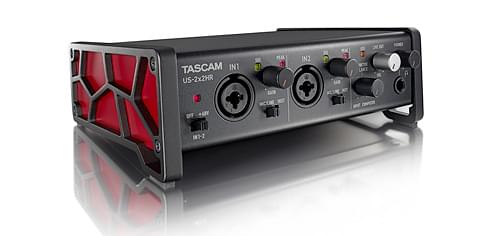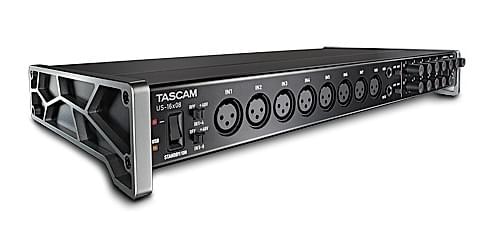US-4x4HR
High-Resolution USB Audio/MIDI Interface (4 in, 4 out)

When two audio channels are not enough
The four-channel US-4x4HR is a member of the Tascam US-HR series of high-resolution USB audio interfaces and an enhanced version of the popular Tascam US-4x4. It provides four mic/line inputs, two of which can alternatively be used for direct input of a guitar or bass, four balanced line outputs, two headphones connectors, and MIDI I/O to your Windows or Mac computer or your iPhone or iPad*. This interface is ideal for multitrack recording of two instruments and two vocalists, for instance, or multi-media production with high demands on simple operation and studio-quality sound. The included loopback function and support for Open Broadcaster Software (OBS Studio), however, makes it also an excellent choice for two-channel podcast creation and live streaming.
Lower noise and distortion – better sound than ever
The versatile US-4x4HR incorporates a wealth of features, including high audio resolution up to 24-bit/192 kHz, ultra-low latency with a Windows buffer size starting at four samples, Ultra-HDDA mic preamplifiers with 48-volt phantom power for superior sound quality with ultra-low noise, a robust USB Type C connector, and a rich assortment of included software to start producing stunning audio right away.

Usability is key
All US-HR models offer a unique dye-cast aluminum honeycomb structure on the side panels with a slight upward tilt. This design not only results in a sleek, eye-catching design, it also provides just the right amount of weight so the interface won’t move when cables are connected or disconnected. Equally important, the upward tilt offers the ergonomic benefit of being angled in such a way as to make the interface easy to work with.
With four microphone preamps for multi-mic setups, four configurable balanced outputs, superb sound quality and easy operation, the US-4x4HR is the ideal choice for the demanding musician, producer or home-recordist requiring more than two audio channels.
* An optional battery pack or AC adapter is required when used with an iPhone or iPad.
| US-4x4HR | US-4x4 | |
|---|---|---|
| Maximum sampling rate | 192 kHz | 96 kHz |
| Gain range (Mic input) | 56 dB | 57 dB |
| Equivalent input noise | –128 dBu | −127 dBu |
| Frequency response (Mic/Line input, 96 kHz) | 20 Hz – 40 kHz +0 dB / −0.4 dB | 20 Hz – 40 kHz +0 dB / –0.3 dB |
| S/N ratio (Mic input) | 110 dB | 101 dB |
| Distortion (THD+N, Mic input) | 0.0013% | 0.003% |
Videos
US-4x4HR Product Presentation
US-HR Series Presentation
All Our Knowledge for That Natural, Crisp and Clear Sound

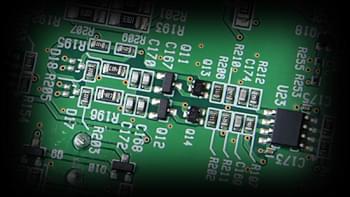 The Ultra-HDDA (High-Definition Discrete Architecture) mic preamps used on the US-HR series feature a discrete construction. They have a higher number of components and are far away from mass-produced preamps. Their EIN (equivalent input noise) rating, which measures the absence of noise, is truly low for the US-2x2HR and US-4x4HR. Combined with a newly improved audio circuit and support for sampling rates up to 192 kHz, our in-house developed microphone preamplifier delivers enhanced audio performance with the most transparent and low-noise sound, reflected in a signal-to-noise ratio of 110 dB.
The Ultra-HDDA (High-Definition Discrete Architecture) mic preamps used on the US-HR series feature a discrete construction. They have a higher number of components and are far away from mass-produced preamps. Their EIN (equivalent input noise) rating, which measures the absence of noise, is truly low for the US-2x2HR and US-4x4HR. Combined with a newly improved audio circuit and support for sampling rates up to 192 kHz, our in-house developed microphone preamplifier delivers enhanced audio performance with the most transparent and low-noise sound, reflected in a signal-to-noise ratio of 110 dB.
- Ultra-low-noise mic preamps achieve −128 dBu EIN (Equivalent Input Noise)
- XLR/TRS jacks allow the input of condenser mics and the balanced connection of synthesizers and other equipment
- Wide gain range ensures sufficient level even with dynamic microphones
- Guitars can be directly connected enabling the use of 3rd-party plug-in effects
Simple, Easy-to-Understand Setup and a Low-Latency USB Driver
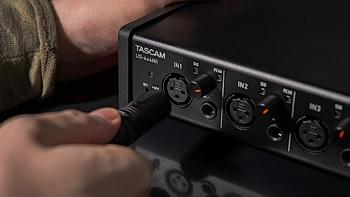
One issue when recording using a computer is latency, which is when audio signals are delayed through digital circuitry. Another is setting up the driver software that is used when connecting an audio interface to a computer. In order to eliminate these problems, our driver software introduces only very little latency and is easy to install. Furthermore, by making the external structure of these interfaces as simple as possible, the Tascam US-2x2HR and US-4x4HR allow users who are not expert users of audio equipment to operate them without concern.
- High-resolution recording up to 192 kHz / 24-bit
- Robust USB Type C computer connection
- Zero-latency direct monitoring function (can be set to mono or stereo for each input pair)
- Windows buffer size can be set from 4 samples up
Multi-mic recording – perfect for use in live performances

The US-4x4HR has four Ultra-HDDA mic preamps. Since up to four condenser mics can be used at the same time, this interface is perfect for recording vocals and acoustical instruments simultaneously. You can also connect two guitars or a guitar and a bass while still having two mic inputs available for vocals.
The unit features four TRS jack outputs, so the individual signals can be output in parallel with the headphones stereo output – often done for multitrack recording. TIP: By using an audio interface to output the sound from a commercial synthesizer app, a richer sound can be achieved.
- Multitrack recording (MTR) mode enables music production similar to using a dedicated multitrack recorder
- Four dynamic mics or condenser mics with phantom power can be used at the same time
- Two headphones outputs for monitoring
Ideal for Podcasts and Live Streaming
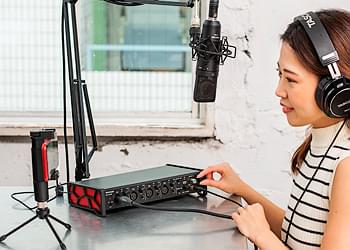
The Settings Panel, which is installed on your computer, comes with a variety of functions. You can choose whether direct monitoring is done in mono or stereo and adjust the balance between input and computer signals. You can also switch the hardware inputs on and off individually and set the Windows buffer size according to your working environment.
For online broadcasting, Internet communication and other live streaming applications, the US-HR series interfaces offer a Loopback function which can merge input signals 1–4 with signals 1/2 coming from the computer (each can be set to mono or stereo) and send that mix to the broadcasting or other software on the computer. A software slider allows to adjust the final “broadcast” volume independently from the unit’s line output level setting.
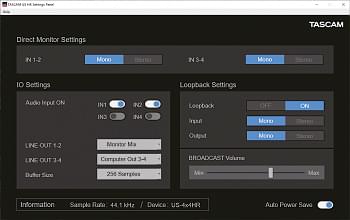
- Inputs can be set on/off individually
- Line output signals can be selected
- Loopback can be set on/off, and each of the merged signal pairs can be switched mono/stereo
- Slider for setting the Loopback master level (broadcast volume)

Support for iPads and other iOS devices
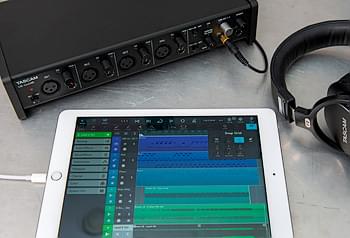 Instead of a computer, you can also use an iPad or iPhone together with the US-2x2HR/US-4x4HR to make music. Performance has been tested with not only the bundled digital audio workstation (Cubasis LE3), but also with other popular recording software – you can continue to use them even if you change DAW software. Since these units include MIDI inputs and outputs, you can connect MIDI keyboards, drum computers etc. to play sounds on the iPad or computer and thus expand your personal orchestra.
Instead of a computer, you can also use an iPad or iPhone together with the US-2x2HR/US-4x4HR to make music. Performance has been tested with not only the bundled digital audio workstation (Cubasis LE3), but also with other popular recording software – you can continue to use them even if you change DAW software. Since these units include MIDI inputs and outputs, you can connect MIDI keyboards, drum computers etc. to play sounds on the iPad or computer and thus expand your personal orchestra.
- Connect with an iPad or iPhone
- Tested with many popular DAW applications
- MIDI input and output enable connection with keyboards, drum computers and other MIDI devices
Bundled Software Enables Music Creation Right Out of the Box
The US-HR models come bundled with world-renowned software that will enhance your production workflow. At the core of music production, Steinberg Cubase LE (including Cubasis LE3) gives you everything you need for composing, multitrack recording, sequencing, editing, and mixing. IK Multimedia Sample Tank SE 4 comes free of charge with a massive 30-Gigabyte sound library encompassing more than 2,000 different musical instruments. And a free 3-month subscription to Auto-Tune Unlimited from Antares, a comprehensive suite of industry-standard pitch correction and vocal effects, gives you the opportunity to create those famous sounds of the pros.
Note: Upgrades may require a fee.
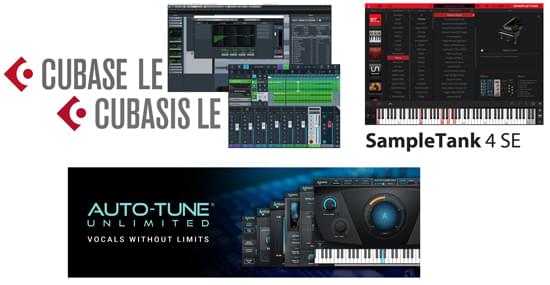
Robust Metal Casing With a Practical and Sleek Design
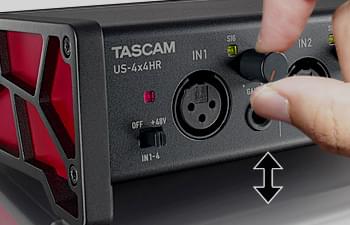
The US-HR models share a solid and practical design intended to withstand years of hard use. Its robust metal jacket not only improves durability. Combined with dye-cast aluminum side panels, it also provides a sleek, eye-catching design. Moreover, the metal structure results in each model having just the right weight, so it won’t move too easily when cables are connected or disconnected.
- Sturdy metal enclosure
- Angled design provides excellent usability on a desktop
What is Direct Monitoring?

When recording audio with a computer, input signals are usually routed through the interface, the computer, and then back to the interface’s outputs. While signals pass the A/D and D/A converters in your interface without any noticeable delay, audio processing by the computer can lead to a clearly audible, disturbing time lag. As a result, you hear your voice or instrument later than the backing tracks played back on the computer and you are hardly able to perform in sync with the playback signal.
By using direct monitoring, input signals are not only sent to the computer but also directly to the outputs of your interface. This allows you to hear your input signal with virtually no delay (or latency) and always in sync with the playback material when recording or performing.
Tip: When recording the signal, mute the track you are recording to. Otherwise you would also hear your performance delayed from the recording track.
Features at a glance
- Advanced version of our popular US-4x4 with even better sound quality
- Provides four audio inputs and four audio outputs as well as a MIDI interface to a Windows or Mac computer or iOS device
- Audio resolution up to 192 kHz / 24 bit
- USB Audio Compliance 2.0 for iOS connection
Hardware features
- Four analogue mic/line inputs on individual XLR and TRS balanced connectors
- High-quality Ultra-HDDA (High Definition Discrete Architecture) microphone pre-amps with ultra-low noise (EIN: –128 dBu)
- Wide input gain range of 56 dB, ideal for dynamic microphones
- Switchable 48-Volt phantom power on XLR inputs
- TRS inputs 1/2 can each be switched to instrument-level for direct recording of guitar or bass
- Four line outputs (balanced TRS)
- Direct monitor option for low-latency monitoring
- Monitor mix control for adjusting the level balance between signals from external devices and signals from the computer
- Two headphones outputs delivering 45 mW per channel
- Independent level controls for line and phones outputs
- MIDI input/output
- Standalone operation as a simple preamplifier for practice sessions and more
- Rugged aluminum body
- Angled industrial design for ease-of-use on a desktop
Software features
- In-house developed driver for Windows devices ensures stable operation with low latency
- The buffer size for Windows can be selcted up from 4 samples to facilitate a recording environment with ultra-low latency
- Each input can be switched on/off individually
- Input monitor mode can be selected between stereo and mono
- You can select which signals are output at the line outputs
- A loopback function allows two audio channels from the computer to be merged with the input signals and send this mix to the streaming or communication software
- Input and computer signals can each be selected between stereo and mono
- A slider lets you adjust the broadcast level
- Switchable auto power save mode to reduce battery consumption on the laptop/tablet computer in mobile use
- Automatic update function available for software, driver and firmware updates (you can install new updates with the press of a button)
- Bundled with Cubase LE and Cubasis LE3 and Antares Auto-Tune Unlimited (free 3-month subscription)
- Compatible with major DAW software (Pro Tools, Live, Cubase, Studio One, GarageBand)
New function with firmware v1.10
- The loopback function now allows all four input channels to be mixed with a stereo signal from the computer
Supported Operating Systems
Windows
- Windows 11 (version 25H2)
- Windows 11 (version 24H2)
- Windows 11 (version 23H2)
- Windows 11 (version 22H2)
- Windows 11 (version 22H1)
- Windows 10 (version 22H2)
- Windows 10 (version 21H2)
- Windows 10 (version 20H2)
- Windows 10 (version 2004)
- Windows 10 (November 2019, version 1909)
- Windows 10 (May 2019, version 1903)
- Windows 8.1
- Windows 7
Mac
- macOS Tahoe (v26)
- macOS Sequoia (v15)
- macOS Sonoma (v14)
- macOS Ventura (v13)
- macOS Monterey (v12)
- macOS Big Sur (v11)
- macOS Catalina (v10.15)
- macOS Mojave (v10.14)
- macOS High Sierra (v10.13)
iOS
- iOS 26 / iPadOS 26
- iOS 18 / iPadOS 18
- iOS 17 / iPadOS 17
- iOS 16 / iPadOS 16
- iOS 14 / iPadOS 14
- iOS 13 / iPadOS 13
- iOS 12
- iOS 11
Specifications
| Audio resolution | |
|---|---|
| Sampling frequencies | 44.1 kHz, 48 kHz, 88.2 kHz, 96 kHz, 176.4 kHz, 192 kHz |
| Quantization bit depth | 24-bit |
| Analogue inputs | |
|---|---|
| Mic inputs (balanced) | XLR-3-31 equivalent (1: GND, 2: HOT, 3: COLD) |
| Input impedance | 2.2 kΩ |
| Rated input level | –7 dBu (0.346 Vrms) |
| Maximum input level | +9 dBu (2.183 Vrms) |
| Gain range | 56 dB |
| Instrument inputs (unbalanced, MIC/LINE INST switch set to INST) | 6.3-mm standard TS stereo jacks (Tip: HOT, Sleeve: GND) |
| Input impedance | ≥1 MΩ |
| Rated input level | –6 dBV (0.501 Vrms) |
| Maximum input level | +10 dBV (3.162 Vrms) |
| Gain range | 56 dB |
| Line inputs (balanced, MIC/LINE INST switch set to MIC/LINE) | 6.3-mm standard TRS stereo jack (Tip: HOT, Ring: COLD, Sleeve: GND) |
| Input impedance | 10 kΩ |
| Rated input level | +4 dBu (1.228 Vrms) |
| Maximum input level | +20 dBu (7.75 Vrms) |
| Gain range | 56 dB |
| Analogue outputs | |
|---|---|
| Line outputs (balanced) | 6.3-mm standard TRS stereo jacks (Tip: HOT, Ring: COLD, Sleeve: GND) |
| Output impedance | 210 Ω |
| Rated output level | +4 dBu (1.228 Vrms) |
| Maximum output level | +20 dBu (7.746 Vrms) |
| Headphone output (PHONES) | 6.3-mm standard stereo jack |
| Maximum output power | 45 mW + 45 mW or higher (THD+N 0.1% or less, into 32 Ω load) |
| Output impedance | 51.5 Ω |
| Load impedance | 16–600 Ω |
| Control inputs/outputs | |
|---|---|
| MIDI IN connector | 5-pin DIN |
| Format | MIDI standard |
| MIDI OUT connector | 5-pin DIN |
| Format | MIDI standard |
| USB | 4-pin USB, Type C |
| Transfer rate | USB 2.0 High Speed (480 MBit/s) |
| Audio performance | |
|---|---|
| Mic amp EIN (equivalent input noise) | ≤−128 dBu (150 Ω termination, GAIN knob at maximum) |
| Frequency response, MIC/LINE input | |
| 44.1 kHz / 48 kHz | 20 Hz – 20 kHz, +0 dB/−0.4 dB (JEITA) |
| 88.2 kHz / 96 kHz | 20 Hz – 40 kHz, +0 dB/−0.4 dB (JEITA) |
| Frequency response, LINE output | |
| 44.1 kHz / 48 kHz | 20 Hz – 20 kHz, +0.2 dB/−0.1 dB (JEITA) |
| 88.2 kHz / 96 kHz | 20 Hz – 40 kHz, +0.2 dB/−0.4 dB (JEITA) |
| S/N ratio | 110 dB (MIC input, GAIN knob at minimum, 20-kHz SPCL LPF, A-weighted) 108 dB (LINE input, GAIN knob at minimum, 20-kHz SPCL LPF, A-weighted) 110 dB (LINE output, LINE OUT knob at maximum, 20-kHz SPCL LPF, A-weighted) |
| Distortion (THD+N) | 0.0013 % (MIC IN, 1 kHz sine wave, −5 dBFS input, GAIN knob at minimum, 20 kHz SPCL LPF) 0.0011 % (LINE IN, 1 kHz sine wave, −5 dBFS input, GAIN knob at minimum, 20 kHz SPCL LPF) 0.0012 % (LINE OUT, 1 kHz sine wave, −4 dBFS input, LINE OUT knob at maximum, 20 kHz SPCL LPF) |
| Crosstalk attenuation | ≥95 dB (MIC/LINE input to LINE output, 1 kHz sine wave, GAIN knob at minimum) |
| Power supply and other specifications | |
|---|---|
| Power supply | |
| When used with a computer | USB bus power or dedicated AC adapter below |
| When used with an iOS device | Dedicated AC adapter (Tascam PS-P1220E, DC 12 V) |
| Power consumption | 2.25 W |
| External dimensions (W × H × D, including protrusions) | 296 mm × 65 mm × 160 mm |
| Weight | 1.6 kg |
| Operating temperature range | 5–35 °C |
Design and specifications subject to change without notice.
Page last modified: 2025-12-17 09:02:09 UTC






